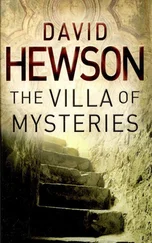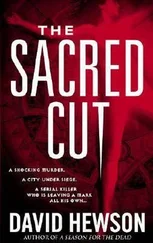Time, he thought. That was what they’d need. Time and each other.
“Tell me what to do,” he urged.
“Be yourself. Be here when I need you.”
Costa thought of his father and the turbulent period his life entered in his thirties. A kind of peace emerged in the end, but it wasn’t achieved without pain or sacrifice. That seemed to be part of human relationships, and it was only the child in him that tried to believe there was another, less arduous way.
“That I guarantee,” he said. “None of this is easy, is it?”
“No. But I imagine it’s better than the alternative.” She leaned to kiss him on the cheek. “That’s why I’m still here. As long as it feels this way, that’s why I’ll stay.”
“In that case I’m a lucky man.”
“Damned right you are,” she agreed. “So how’s Leo? Will he go back to the job?”
Costa had spent the previous morning with Falcone in the hospital. It was good to see his progress, though the man was different somehow, as was their relationship.
“He’s on the mend. Leo will be back in the Questura. In the end.” He picked up a bunch of grapes on the table. “And before this turns to vinegar. We’ll both be back.”
“Both?”
She leaned forward, in anticipation and some concern, waiting for the rest. It was good news. Costa had convinced himself of that.
“I have a small assignment along the way.”
“Where?” she asked quickly.
“Rome. Just Rome. With a little travel I think you could enjoy too.”
“Nic . . . ?”
He’d spent the previous afternoon discussing everything with Luca Zecchini over a long and enjoyable lunch in an expensive restaurant just off the tourist haunts off the Rialto. It was an unexpected offer, but the Carabinieri and the state police were supposed to liaise from time to time. It was a reward too, a deserved one.
“Zecchini’s people cracked those files you gave them. Almost the first time they tried.”
“That’s not possible.”
“They found the password. It was based on the phone number at Massiter’s previous home in Venice. Apparently—”
“Apparently the Carabinieri have some very smart people,” she interrupted. “What did they get?”
“Names. Bank accounts. Routes. Shipments. Everything. It’s a gold mine. Read the papers over the next few weeks. It’s the biggest breakthrough they’ve had in years.”
She laughed. “Hugo always struck me as the kind of man who’d be lax about things. He felt invulnerable. He knew they’d never touch him.”
“They didn’t. They just picked the lock. Without you . . .”
“Then . . .” Emily looked wistfully at the garden, with its rampant weeds and untended vegetables. “I was going to say it was worth it. But it wasn’t.”
Nic Costa looked at her, made sure she knew he felt the same way. He’d learned something in Venice. That there was a limit to the price he’d pay—and allow of anyone—from now on.
“No,” he agreed. “It wasn’t. There’s an art exhibition planned for Rome in the spring. The biggest in years. Zecchini threw me a ticket to be part of security. It’s a reward. I get to see such things. They’re bringing a Caravaggio from London for the event. Boy Bitten by a Lizard. I’ll have to make sure it gets here and back in one piece. Lots of others too. You’ve been to London. Do you know it?”
“It’s wonderful,” Emily said, that familiar spirit of delight now back in her face. “There’s a young, innocent-looking boy, a flower in his hair, the kind Caravaggio liked. He’s reaching into a bowl of fruit. All of a sudden a small lizard leaps out and bites his hand. Hard. You see the boy’s shock and his hurt, and it’s all the more real because he was expecting pleasure. It’s an allegory, I guess. About the sudden pain you can get when what you’re really expecting is its opposite. You’ve never seen it?”
Paintings had left his life of late. He realised now how much he missed them.
“When you’re unpacked you can help me with the fruit,” Emily Deacon declared. “Caravaggio or no Caravaggio, I’m not letting all those grapes go to waste.”
He’d managed to recall the image of the painting now. Nic Costa couldn’t wait to witness the canvas close up, real, as alive as the day it was painted. With Emily at his side.
“Everyone gets bitten by the lizard sometime,” he said. “What matters is what happens after.”

WHY ARE YOU PURSUING THIS, LEO?”
It seemed a curious question.
“Because it’s what I do.”
“Without asking yourself the purpose? Or the price?”
She sat on the bench, still, confident. He heard the blast of the vaporetto’s horn as it departed the quay on the far side of the island.
“It’s what I do,” he said again.
“But why? The Venice Questura won’t listen to you. No one will. Not even your own men, I think. Have you told them?”
“No,” he admitted. “I wanted to discuss this with you first.”
“Always the gentleman,” she said with a brief smile.
“There is evidence,” he pointed out. “You provided it yourself. The shirt with Massiter’s monogram and Bella’s blood on it. The second DNA sample there, which is primarily sweat, lacks the Y chromosome. Teresa found out shortly before Massiter was killed, too late to be of use unfortunately. It’s female DNA. We don’t have a sample of yours but I’d put good money on it being a match.”
“I washed everything in that house, some of it by hand,” she said, half smiling. “Would that be such a surprise?”
“Then . . .”
Leo Falcone had, to his dismay, never considered this. He was now abruptly aware that he had lost more of his sharpness in hospital than he’d appreciated. There was one plain fact outstanding, though.
“I asked Teresa to bring the shirt to me. It appeared to me that the monogram was hand-stitched, which would be unusual for a man who would buy his shirts in bulk, even from the best of tailors. Also the cut was poor. More the kind of thing Uriel would have worn than a wealthy Englishman.”
She continued to look at him, bemused, saying nothing.
“You stitched the letters on Uriel’s bloodied shirt yourself when you saw the way Nic’s mind was working. If the blame was to shift from Bracci, you needed to ensure it went to Massiter, though not in time to ruin the contract, naturally. Forensic could clarify all this . . .”
“You’re a man in a wheelchair, Leo. Not an inspector in charge of a murder inquiry. Badly cut shirts? Hand-stitched letters? Do you think anyone will listen to these ramblings except me?”
He wasn’t sure he cared anymore.
“I was pleased by this discovery,” Falcone went on. “Had the shirt really been Massiter’s it could only have meant you’d stolen it beforehand, with the idea of killing Bella in mind. That what I was dealing with was a matter of forethought, not some desperate improvisation after the fact. I was very glad not to be wrong on that matter.”
Raffaella Arcangelo waited, watching his discomfort at having to make such a personal confession. “Men never consider these things, do they? Washing. Cleaning. Sewing. All the dreary work. All the drudgery. It just happens somewhere else, performed by unseen hands. None of my brothers noticed. Not even Uriel, who was the nearest to being a true human being among them. I was simply one more element in the mechanism of that household. Like a machine or some menial from outside.”
“You sound as if you hated them,” he said, surprised.
Читать дальше













